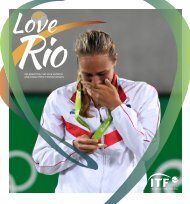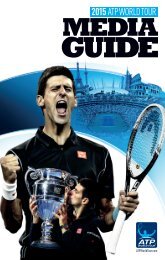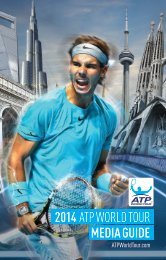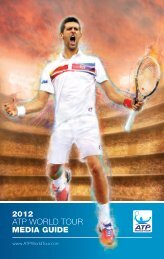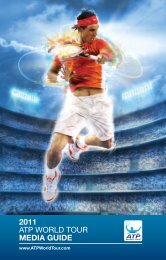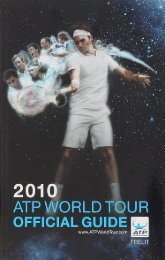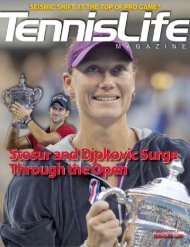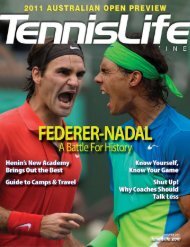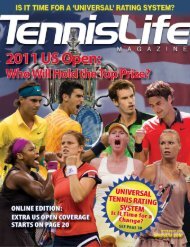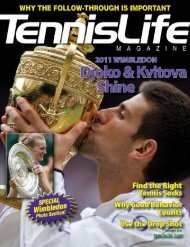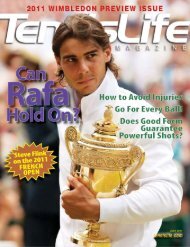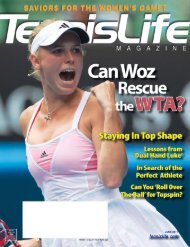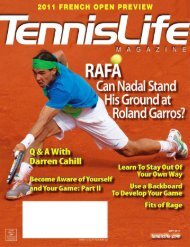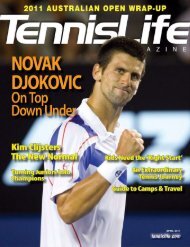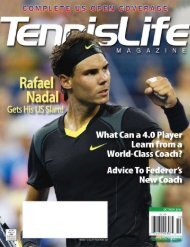A Champion's Mind - Pete Sampras
www.tennismoscow.me Insta:TENNISMOSCOW
www.tennismoscow.me Insta:TENNISMOSCOW
Create successful ePaper yourself
Turn your PDF publications into a flip-book with our unique Google optimized e-Paper software.
one thing I most needed—time to hit my shots.<br />
When I played McEnroe in Toronto, he was in the waning years of his career. I was comfortable. I also<br />
knew him a little bit. It’s funny how quickly you get over your awe of a top player when you come onto the<br />
tour, especially if he’s your countryman and you have the inevitable string of experiences and contacts<br />
with him. I can totally understand why Jimmy Connors was always such a loner—so standoffish and<br />
aloof. He wanted his peers—all of them—to stay in awe. John had always been nice to me, and so had<br />
Lendl. But where Lendl’s game still gave me pause, I was in a comfort zone with John, physically and<br />
psychologically. At Toronto, I beat him 6–3 in the third, but I lost a heartbreaker to Michael Chang in the<br />
semifinals, 7–5 in the third.<br />
When Joe Brandi and I rolled into New York for the U.S. Open in late August of 1990, we bunked<br />
together at the Parker Meridien. I wasn’t really a city guy; I was a shy nineteen-year-old going about his<br />
business from the player hotel. I don’t remember if Brandi snored, but I know I slept very well in our<br />
shared room, and it was because I had nothing to lose. There was no pressure. About the only other<br />
person I spent time with during the tournament was my friend Jim Courier.<br />
I started my quest at Flushing Meadows as a dark horse, although I was definitely on the radar of my<br />
rivals, the pundits, and knowledgeable fans. Through 1990, I was slowly becoming a better mover and<br />
all-around athlete, and my serve—already vastly improved—just kept getting better. There was no magic<br />
bullet, coaching or techniquewise. Suddenly the big serve was just there, and getting bigger as the months<br />
passed.<br />
In the early rounds at the Open, I beat Dan Goldie, <strong>Pete</strong>r Lundgren, and Jakob Hlasek. Those were<br />
solid wins, and each one seemed to increase my momentum. I got hot and stayed hot, playing almost the<br />
entire event in the proverbial zone—that tranquil state of mind and body in which nothing can go wrong,<br />
you seem to have all the time in the world, the ball looks big as a grapefruit, and nothing can disturb or<br />
stop you. If ever there was a “good” time for me to go up against Lendl again, it was then—in the<br />
quarterfinals at Flushing Meadows. But the assignment was a tough one. Lendl was a multiple Grand Slam<br />
champ with more big titles than McEnroe, and he was gunning to make an unprecedented nine consecutive<br />
U.S. Open finals. He was at or very close to the peak of his powers and still driven to add to his résumé.<br />
This would be different from the Wilander match in ’89.<br />
I had reason to hope that I wouldn’t be blitzed like I had been in Milan. I had seen Ivan’s A game, so<br />
there would be no surprises. And my improved serve gave me more offense; it made me a little more<br />
dangerous, and that had psychological as well as physical implications. In the six months since I had last<br />
met Ivan, I’d grown stronger and sharper. I felt that, and I knew that I could give as good as I got. I was<br />
confident that I could put Ivan under as much pressure when I was serving as he put me under when I was<br />
returning. But it didn’t exactly make me comfortable knowing that the match might be decided by our<br />
ground strokes because, in that department, Lendl still had me beat—hands down. My job was to make it<br />
a service brawl.<br />
I won the first two sets 6–4, 7–6, and the tennis was high-quality stuff. I was serving big, and my basic<br />
strategy was to hold easily and slap a few forehand winners here and there—just enough to take<br />
advantage of any momentary lapse or weakness in Ivan’s game or resolve. After the second set, though, I<br />
made the classic rookie mistake. Finding myself in control, I thought I had it won—ignoring the fact that I<br />
was up against a lethal opponent who had found his back against the wall on plenty of other occasions,<br />
only to extricate himself. And that’s exactly when Lendl’s experience and determination kicked into high<br />
gear.<br />
Lendl came storming back, with the leverage of eight straight U.S. Open finals and eight Grand Slam<br />
titles giving him emotional and physical fuel. He took the next two sets 6–3, 6–4. In the fifth set, though, it



